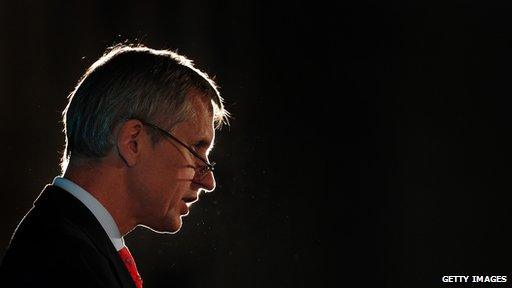George Osborne 'concerned' by FCA's behaviour
- Published

Under pressure: But Martin Wheatley said he will not resign as boss of the FCA
Chancellor George Osborne has said he is "profoundly concerned" by the behaviour of the city regulator, the Financial Conduct Authority (FCA).
Millions of pounds were wiped off share values last week, after the FCA leaked information about a new investigation.
Mr Osborne said the events had been damaging both to the FCA and to the UK's reputation.
The FCA has said the organisation's behaviour will be fully investigated, by an external law firm.
Mr Osborne has written to the FCA's chairman, John Griffith-Jones, warning him that the FCA must answer several key questions in its inquiry.
"These events go to the heart of the FCA's responsibility for the integrity and good order of the UK's financial markets, and have been damaging both to the FCA as an institution and to the UK's reputation for regulatory stability and competence," Mr Osborne wrote.
Share plunge
Martin Wheatley, the FCA's chief executive, admitted the leaked launch of the insurance industry inquiry was "not our finest hour".
Mr Wheatley told the BBC that he would not resign from his job - as some have demanded - but would await the outcome of the FCA's inquiry.
The news that the FCA was going to investigate pensions, life insurance and endowment policies issued between 1970 and 2000 was leaked to a national newspaper last Friday.
It caused some insurance stocks to plunge by up to 20% that day.
After the newspaper article was published, it took the FCA six hours to issue a clarification.
"It's not a good position," Mr Wheatley said.
"I'm not defending that position, but there are processes that have to be gone through," he told Radio 4.
Investigation
The news was originally due to be publicised in the FCA's annual business plan three days later.
The FCA's investigation will look at whether the information released was market-sensitive.
Among the questions raised by the chancellor are:
Who authorised the briefing to a single journalist, and why?
Why did the FCA take so long to clarify the story?
To what extent was there a disorderly market in shares in the meantime?
What other pre-briefings has the FCA taken part in?
Who is accountable, and what disciplinary action should be taken?
Mr Wheatley said all the details would be examined in the forthcoming inquiry.
"There are a number of things that need looking into, and we've got an investigation that will do that," he said.
"I'm sure we will be very upfront about taking criticisms on board, and what we need to do differently," he told the BBC.
Conditions
So what are the implications for policy-holders who find themselves unable to get out of expensive policies they took out in the 1980s and 90s?
Having learnt the harsh lessons of premature publicity, Mr Wheatley was keen not to prejudge the outcome of the inquiry.
He did say the FCA inquiry would look at the conditions that were set at the time the policies were taken out, whether they were clear, and whether they were fair.
However - and this will be of comfort to the industry - he suggested that there would not be harsh penalties imposed for mistakes in the past.
"We would not be retrospectively imposing today's standards on activities of 10, 15 or 20 years ago," he said.
It is not yet known when the inquiry into the FCA's actions will make its conclusions public.
- Published28 March 2014

- Published29 March 2014
